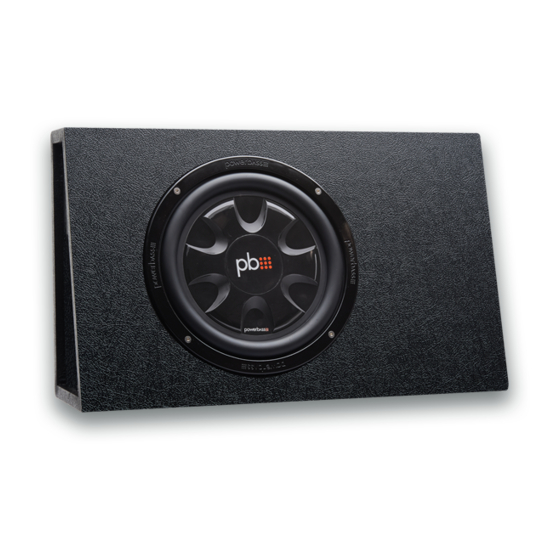Table of Contents
Advertisement
Quick Links
Advertisement
Table of Contents

Summary of Contents for PowerBass PS-WB110T
- Page 1 Autosound Single Thin Subwoofer Air Susupension System Application & Enclosure Guide Please read through this manual to familiarize yourself with your new subwoofer. Should your PowerBass Autosound subwoofer ever require service, you will need to have the original dated receipt.
- Page 3 170 dB. Please observe all local sound ordinances while listening to your PowerBass Autosound system. PowerBass USA, Inc. accepts no liability for hearing loss, bodily injury, or property damage due to the...
- Page 4 POWERBASS AUTOSOUND LOADED ENCLOSURE FEATURES Air Suspension Bass: Chosen because of its ability to reproduce good low frequency response in a small area, this ultra-thin sealed enclosure is constructed at 5/8 non-resonant material. One Piece Injection Molded Cone: This design ensures low distortion bass reproduction and voice coil alignment.
- Page 5 Installation of PowerBass Autosound Speakers requires experience with a variety of mechanical and elec- trical procedures. This manual only provides general installation and operating instructions. If you have any reservations about your installation skills or lack the proper tools, please contact your local PowerBass Autosound dealer for assistance.
-
Page 6: Installation Tips
Use speaker wire large enough to carry the full power of your amplifier. 14-gauge or larger should be adequate. (Speaker wire not included) Your PowerBass Air Suspension subwoofer system needs to be installed some place where it can operate ef- ficiently and not endanger the occupants of the vehicle. -
Page 7: Wiring And Connections
WIRING AND CONNECTIONS The PowerBass Air Suspension subwoofer system consists of a single 4-ohm voice coil woofer. Check to see that your amplifier is optimized to drive this load. A single spring loaded push terminal cup provides a quick and easy connection from your bass amplifier to your Air Suspension system Fig.1... -
Page 8: Sound Check
SOUND CHECK Your PowerBass Air Suspension Subwoofer system will operate at optimum performance after a break-in period. Allow the system to play 20 to 30 hours at moderate levels. To sufficiently drive either the Single Woofer 10 or 12-inch system, we recommend using an amplifier with at least 100 watts RMS mono output. -
Page 9: Warranty Notes
Should a warranty issue arise with our complete subwoofer enclosure PowerBass will replace the defec- tive woofer only. Do not send the entire enclosure, unless the enclosure is defective itself. PowerBass does not warranty the cosmetics of the enclosure once installed in the vehicle. - Page 10 PowerBass and the CEA want you listening for a lifetime! This manual is the exclusive property of PowerBass USA, Inc. Any reproduction of this manual, or use other than its intentions is strictly prohibited without the express consent of PowerBass USA, Inc.
- Page 11 Some states do not allow limitations on the length of an implied warranty, so this limitation may not apply. No person is authorized to assume for PowerBass any other liability in connection with the sale of this product.
- Page 12 PowerBass Autosound – A division of PowerBass USA, Inc. 13936 Mountain Avenue – Chino, CA 91710 Tel. (909) 993-5399 – Fax (909) 993-5393 www.powerbassusa.com...
















Need help?
Do you have a question about the PS-WB110T and is the answer not in the manual?
Questions and answers